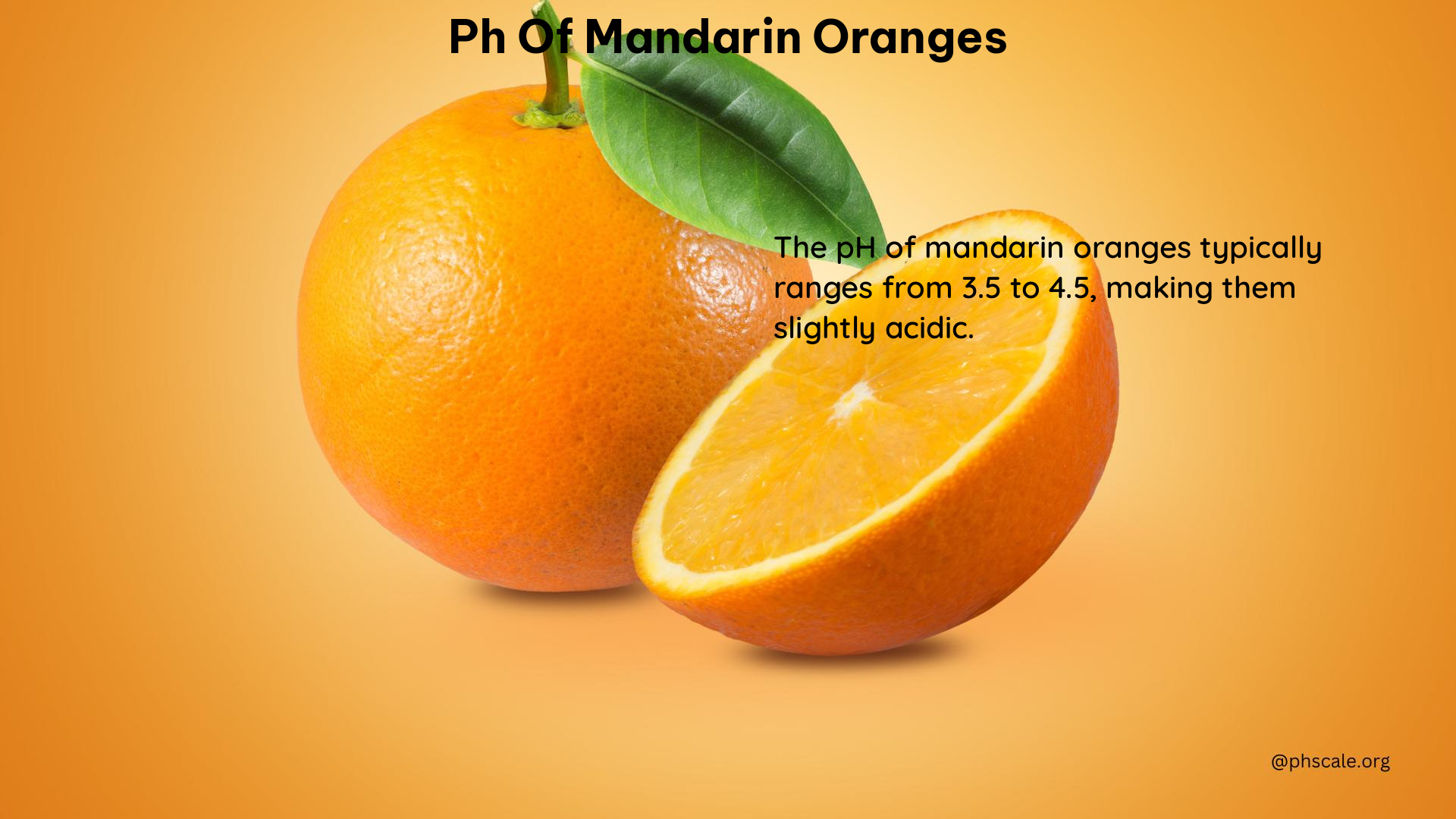The pH level of mandarin oranges is a crucial aspect to understand, especially for those interested in maintaining a balanced diet and managing digestive health. Mandarin oranges have a pH range of 8.0 to 9.0, making them an alkaline food group. This unique characteristic sets them apart from other citrus fruits and offers various health benefits.
Understanding the pH Level of Fresh Mandarin Oranges
Mandarin oranges, also known as tangerines, are a type of citrus fruit that are native to China. When fresh, these oranges have a pH level ranging from 8.0 to 9.0, which is significantly higher than other citrus fruits like lemons (pH 2.30), limes (pH 2.40), and grapefruits (pH 3.38). Even oranges, which are often considered acidic, have a lower pH range of 3.69 to 4.34.
The pH Level After Digestion

The alkaline nature of mandarin oranges persists even after they are digested. The body metabolizes the fruit, converting its acidic properties into alkaline compounds. This means that the pH level of mandarin oranges remains in the 8.0 to 9.0 range, even after they have been processed by the digestive system.
Health Implications of the Alkaline pH
The alkaline nature of mandarin oranges offers several health benefits:
-
Improved Digestion: The high pH level of mandarin oranges can help soothe the digestive system and promote healthy gut function. They are low in FODMAPs, making them suitable for individuals with digestive issues like bloating, gas, constipation, or diarrhea.
-
Immune System Support: The alkaline properties of mandarin oranges can help maintain a balanced pH in the body, which is essential for a healthy immune system.
-
Reduced Inflammation: The alkaline nature of mandarin oranges may help reduce inflammation in the body, which can be beneficial for individuals with certain health conditions.
Contaminants and Chemicals
Mandarin oranges are generally free from significant contaminants and chemicals. However, they may contain small amounts of pesticides, heavy metals, or other residues depending on the growing and processing methods. It is essential to choose organic or locally grown mandarin oranges whenever possible to minimize exposure to these potential contaminants.
Balancing pH Levels with Mandarin Oranges
To maintain a balanced diet, it is important to consume a mix of acidic and alkaline foods. Mandarin oranges can be a healthy addition to an alkaline diet, especially when combined with other fruits and vegetables. Incorporating mandarin oranges into your diet can help create a more balanced pH level in the body.
Home Remedies and DIY Tips
To maximize the benefits of mandarin oranges, it is recommended to consume them fresh and ripe. Avoid canned or processed mandarin oranges, as they can be more acidic and less nutritious. You can use mandarin oranges in fruit salads, smoothies, or other healthy recipes to create a balanced and alkaline snack or meal.
History and Nutrition
Mandarin oranges have been cultivated for centuries and are native to China. They are a hybrid of the pomelo and the citron, and are rich in vitamin C, potassium, and fiber, making them a nutritious addition to a healthy diet.
In conclusion, the pH level of mandarin oranges is a unique characteristic that sets them apart from other citrus fruits. With a pH range of 8.0 to 9.0, mandarin oranges are an alkaline food group that can offer various health benefits, particularly for digestive health and immune system support. By understanding the pH level of mandarin oranges and incorporating them into a balanced diet, individuals can take steps towards maintaining a healthy and alkaline lifestyle.
References:
- Clemson University. (n.d.). pH Values of Common Foods and Ingredients. Retrieved from https://www.clemson.edu/extension/food/food2market/documents/ph_of_common_foods.pdf
- Science Investigation. (n.d.). The Research – pH Levels in Different Citrus Fruits. Retrieved from https://science-investigation.weebly.com/the-research.html
- Wikipedia. (n.d.). Mandarin Orange. Retrieved from https://en.wikipedia.org/wiki/Mandarin_orange
- Healabel. (2023). Mandarin Orange Benefits, Side Effects: Gluten Free, Acidic? Retrieved from https://www.healabel.com/mandarin-orange-benefits/
- ScienceDirect. (n.d.). Mandarin Juice – an overview. Retrieved from https://www.sciencedirect.com/topics/agricultural-and-biological-sciences/mandarin-juice
